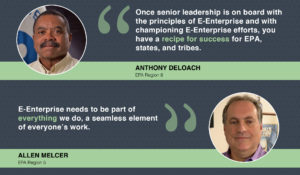
In order to enhance engagement among E-Enterprise partners, EPA established the E-Enterprise Regional Coordinators (EERC) network in 2017, identifying ten EPA contacts to directly support state and tribal partners and coordinate throughout EPA. Endorsed by the E-Enterprise Leadership Council (EELC), the EERC team serves as a virtual communication highway across the nation.
Since the fall of 2018, the EERC network has been co-chaired by Anthony Deloach of Region 8 and Allen Melcer of Region 5. Below, Anthony and Allen reflect upon their roles as EERC Co-Chairs and the valuable lessons each has learned along the way.
What roles do you fill on behalf of the E-Enterprise initiative?
Anthony: As a co-lead for the EERC team, I assist by transferring information and supporting ongoing E-Enterprise project work with the states and tribes in my region. I also have personal connections with my regional colleagues and encourage them to reach out to states and tribes to discuss how E-Enterprise can help us work better together. In addition, I play an active role marketing E-Enterprise throughout the regional programs, articulating the vision of using the Performance Partnership Agreements/Grants (PPAs/PPGs) and other grant tools to leverage collaborative opportunities with states and tribes.
Allen: Applying the principle of joint governance to serve as a conduit to share E-Enterprise information among the partners is one of my main roles as a regional coordinator. In Region 5, my job is to work within EPA and with the states and tribes to spread the word about E-Enterprise and share information on priorities, projects, and concerns among partners. Often, our partners are working on new applications of interest to others and sharing information on these projects can save time and resources. In addition, as an EERC Co-Chair, I help identify program areas where the EERCs have a role to play and can make a difference.
What has been the most rewarding aspect of your involvement in E-Enterprise?
Anthony: I am most encouraged by states and tribes seeking to use their PPA/PPG flexibilities in their environmental efforts and applying innovative principles (streamlining, collaborative problem-solving, etc.) to enhance environmental protection for the future. The PPG process is an underutilized opportunity to learn in tandem and potentially record and report the success and broader application of E-Enterprise work where we have shared or common interests.
Allen: Producing improvements in environmental protection through modernizing processes and data flow, transfer, and analysis has been the most rewarding element of E-Enterprise. E-Enterprise plays a significant role in process improvement and information sharing. I find it very gratifying to help develop solutions that can reduce the time and effort it takes to perform activities like conducting inspections, tracking the movement of hazardous waste through E-Manifest, making information available to the public, and processing and managing grants.
In which specific E-Enterprise projects are you currently involved, and how will that work improve environmental outcomes?
Anthony: I am actively involved in a project with the state of Colorado and the EPA Office of Enforcement and Compliance Assurance to modernize the Integrated Compliance Information System (ICIS). I am also assisting the state of Utah on utilizing flexibility with its PPA/PPG carryover funds to help fund its Hazardous Waste database system. Both efforts support and draw from the E-Enterprise Digital Strategy.
Allen: I am currently involved in expanding and publicizing the Disaster Debris Recovery Tool (DDRT). Disasters such as hurricanes and floods produce a lot of debris, including fallen trees, ruined automobiles, and household wastes that can be recycled or managed in such a way to prevent environmental contamination. The DDRT provides information on recycling and disposal facilities across the country so that in the aftermath of a disaster, materials will be properly managed. DDRT was successfully rolled out across the country, and we are now setting up processes to keep information in the tool up to date, while also working to promote the use of the tool among state, tribal, and local officials.
What lessons have you learned through your experience with E-Enterprise?
Anthony: The main lesson I have learned is that it is important to have management and staff support at all levels to fully realize the benefits of E-Enterprise. Once senior leadership is on board with the principles of E-Enterprise and with championing E-Enterprise efforts, you have a recipe for success for EPA, states, and tribes.
Allen: I have learned that regardless of how important an idea is, or how obvious the benefits, without widespread management support the idea will not take root. E-Enterprise needs to be part of everything we do, a seamless element of everyone’s work. As staff and managers go about our day-to-day work, we should be thinking about how processes can be improved and how information can be better shared. To get to this state, we need all levels of management across all our respective agencies to promote the idea of working with our partners to find ways to better serve the public.
